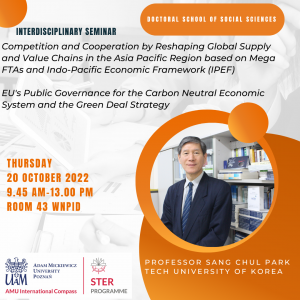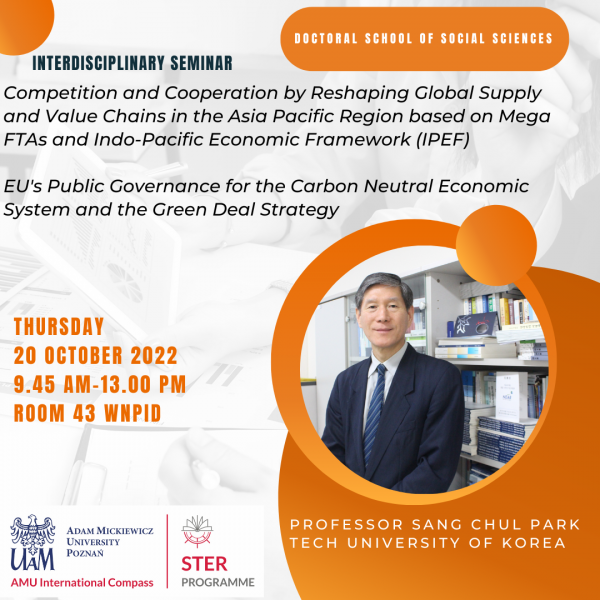Serdecznie zapraszamy na wykłady prof. Sang Chul Parka w ramach interdyscyplinarnego bloku przedmiotów. Spotkanie obędzie w formie hybrydowej.
Formularz rejestracyjny aktywny do 18 października: https://forms.office.com/r/i3ngPGUr67
Biographical notes for Prof. Sang-Chul Park
Sang-Chul Park has received PhD degrees in political science in Aug. 1993 in Germany and economics in Feb. 1997 in Sweden. He also passed a habilitation examination (full professorship) in political science in Nov. 2002 in Germany as well as a docent evaluation (Swedish habilitation) in economics in Sep. 2004 in Sweden and is currently a Full Professor at Graduate School of Knowledge based Technology and Energy, Tech University of Korea since 2006. He was an Adjunct Professor at Korea Advanced Institute of Science and Technology (KAIST), and a Visiting Professor at Seoul National University, ROK. He was also a Private Dozent at Justus Liebig University in Giessen, Germany and Visiting Full Professor at Gothenburg University, Sweden. He served as Associate Professor at Gothenburg University, Sweden from 2001 to 2003 and as Associate Professor at Okayama University, Japan from 2003 to 2006. He also stayed as Visiting Professor at Fudan University, China (2014), Asian Development Bank Institute (ADBI), Japan (2014), University of Utara Malaysia (UUM), Malaysia (2013~2014), Maria Currie Skldowska University, Poland (2016~2021), and at Chiang Mai National University in Thailand (2019).
In addition, he was a member of editorial advisory board for Korea Observer (SSCI Journal) (2007~2010) and Journal of Small Business Management (JSBM) (SSCI Journal) (2010~2012). In 2012, he became the editor in chief of Asia Pacific Journal of EU Studies (APJEUS) and a member of editorial board in International Journal of Innovation and Regional Development (IJIRD) in 2014. Since 2016 he has served as associate editor for International Journal of Management and Enterprise Development (IMED) (SCOPUS Journal) and a member of Managing Editorial Board in Australian & New Zealand Journal of European Studies (ANZJES). He also served as a member of Presidential Committee on New Southern Policy in the Korean government from Dec. 2018 to May. 2022.
Topics Oct. 20 room 43 WNPID UAM 9.45-13.00
- Competition and Cooperation by Reshaping Global Supply and Value Chains in the Asia Pacific Region based on Mega FTAs and Indo Pacific Economic Framework (IPEF)
Global economic environment has changed dramatically since the global financial crisis (GFC) in 2008. Since then, East Asia has become the hub of the global economic growth based on trade and FDI. As a result, the two Mega FTAs such as the RCEP and the CPTPP have been created for further regional economic integration and shaping regional and global supply chains. In order to check and control the Chinese expansion in the region, the USA has tried to return to East Asia not only as military and political power, but also economic power in the region and to attract East Asian countries including Oceanian by creating IPEF. Therefore, it is inevitable for the RCEP and the IPEF to compete with each other and at the same time for the CPTPP and the IPEF to cooperate with each other in the region for their economic security.
- EU's Public Governance for the Carbon Neutral Economic System and the Green Deal Strategy
Climate change is a reality affecting the global economy, politics, and society comprehensively. The EU has initiated its common climate and energy policies since 2007 in order to tackle global warming issues and set its policy target for the 20/20/20 strategy in
2009. It achieved its target in 2018 that is two years earlier than expected. Based on the policy result, the EU set its long term target to create the carbon neutral economic system by 2050. The Green Deal Strategy is its policy tool to achieve the final target.


